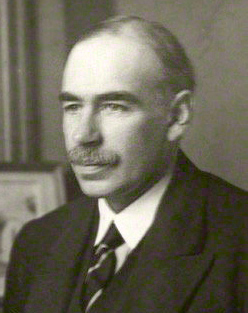Original: «We are being afflicted with a new disease of which some readers may not yet have heard the name, but of which they will hear a great deal in the years to come – namely "technological unemployment". This means unemployment due to our discovery of means of economizing the use of labor outrunning the pace at which we can find new uses for labor».
Fuente: The General Theory of Unemployment, Interest and Money, 1931.
Frases célebres de John Maynard Keynes
Fuente: Ensayos de persuasión.
Fuente: El fin del laisez-faire.
“Los especuladores son una consecuencia y no una causa de los precios altos.”
La especulación financiera
Fuente: Ensayos de persuasión.
Frases sobre la riqueza de John Maynard Keynes
Fuente: Teoría general del empleo, interés y la moneda.
John Maynard Keynes Frases y Citas
La especulación financiera
Fuente: Lords of Finance: 1929, The Great Depression, and the Bankers who Broke the World.
Fuente: Teoría general del empleo, interés y la moneda.
Fuente: Ensayos de persuasión.
Fuente: Teoría general del empleo, del interés y la moneda.
Fuente: Ensayos de persuasión.
La especulación financiera
Fuente: Teoría general del empleo, del interés y la moneda, 1936.
La especulación financiera
Fuente: Teoría general del empleo, del interés y la moneda, 1936.
La especulación financiera
Fuente: Las consecuencias económicas de la paz.
Respuesta a la pregunta: "¿Por qué no me afilio al Partido Laborista?"
Fuente: De su conferencia ¿Soy un liberal?, recogida en Ensayos en persuasión, 1925.
John Maynard Keynes: Frases en inglés
“Ideas shape the course of history.”
As quoted in The Peter Plan: A Proposal for Survival (1976) by Laurence J. Peter, p. 97
Attributed
“The avoidance of taxes is the only intellectual pursuit that still carries any reward.”
As quoted in A Dictionary of Scientific Quotations (1977) by Alan L. MacKay, p. 140
Attributed
Fuente: The Economic Consequences of the Peace
Fuente: Essays In Biography (1933), Alfred Marshall, p. 188
"A Short View of Russia" (1925); Originally three essays for the Nation and Athenaeum, later published separately as A Short View of Russia (1925), then edited down for publication in Essays in Persuasion (1931)
Ref: en.wikiquote.org - John Maynard Keynes / Quotes / Essays in Persuasion (1931)
Essays in Persuasion (1931), A Short View of Russia (1925)
Letter to Roy Harrod (4 July 1938), in The Collected Writings of John Maynard Keynes, Vol. XIV (1971), p. 297
Essays in Persuasion (1931), Social Consequences of Changes in The Value of Money (1923)
Fuente: The Economic Consequences of the Peace (1919), Chapter IV, Section I, p. 77
“We will not have any more crashes in our time.”
Conversation with Felix Somary in 1927, reported in Felix Somary, The Raven of Zurich, London: C. Hurst, 1986 (1960), 146-7
Attributed
Fuente: How to Pay for the War (1940), Ch. 5 : A Plan for Deferred Pay, Family, Allowances and a Cheap Ration
“Logic, like lyrical poetry, is no employment for the middle-aged”
Fuente: Essays In Biography (1933), F. P. Ramsey, p. 296
Originally published in The Economic Journal, March 1930. and The New Statesman and Nation, October 3, 1931
Essays in Persuasion (1931), Economic Possibilities for our Grandchildren (1930)
Fuente: How to Pay for the War (1940), Ch. 1 : The Character of the Problem
Fuente: How to Pay for the War (1940), Ch. 2 : The Character of the Solution
Fuente: How to Pay for the War (1940), Ch. 5 : A Plan for Deferred Pay, Family, Allowances and a Cheap Ration
On Isaac Newton
Essays In Biography (1933), Newton, the Man
First Annual Report of the Arts Council (1945-1946)
Fuente: The Economic Consequences of the Peace (1919), Chapter III, p. 33
Fuente: The Economic Consequences of the Peace (1919), Chapter II, Section III, p. 21
Fuente: Essays in Persuasion (1931), The End of Laissez-faire (1926), Ch. 1
National self-sufficiency (1933) http://www.panarchy.org/keynes/national.1933.html Section 3, republished in Collected Writings Vol. 11 (1982).
“I work for a Government I despise for ends I think criminal.”
Letter to Duncan Grant (15 December 1917)
Fuente: The Economic Consequences of the Peace (1919), Chapter VI, p. 250
“The atomic hypothesis which had worked so splendidly in Physics breaks down in Psychics.”
"Francis Ysidro Edgeworth", p. 286; Originally published in The Economic Journal, March 1926
Ref: en.wikiquote.org - John Maynard Keynes / Quotes / Essays In Biography (1933)
Essays In Biography (1933), Francis Ysidro Edgeworth
